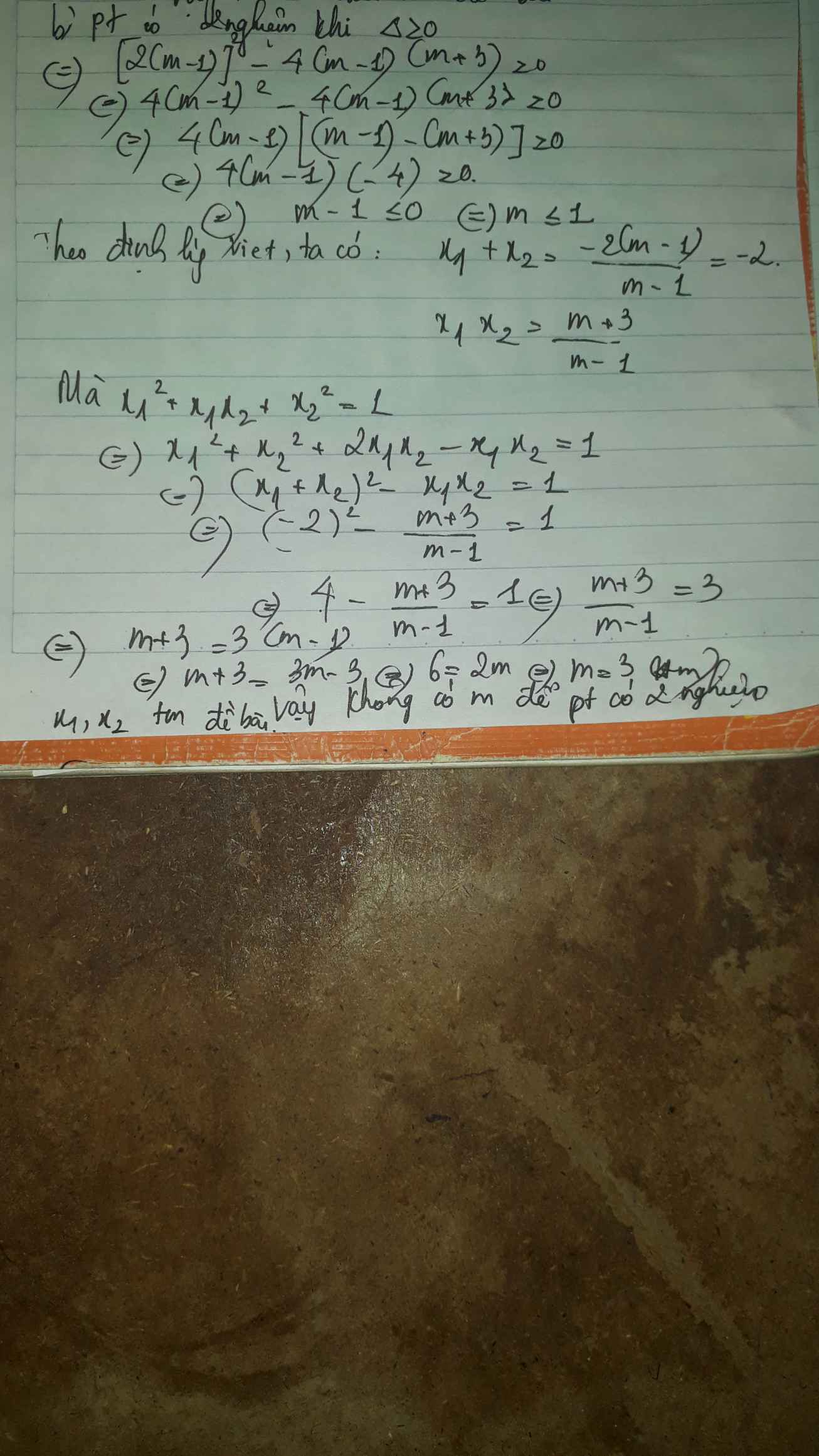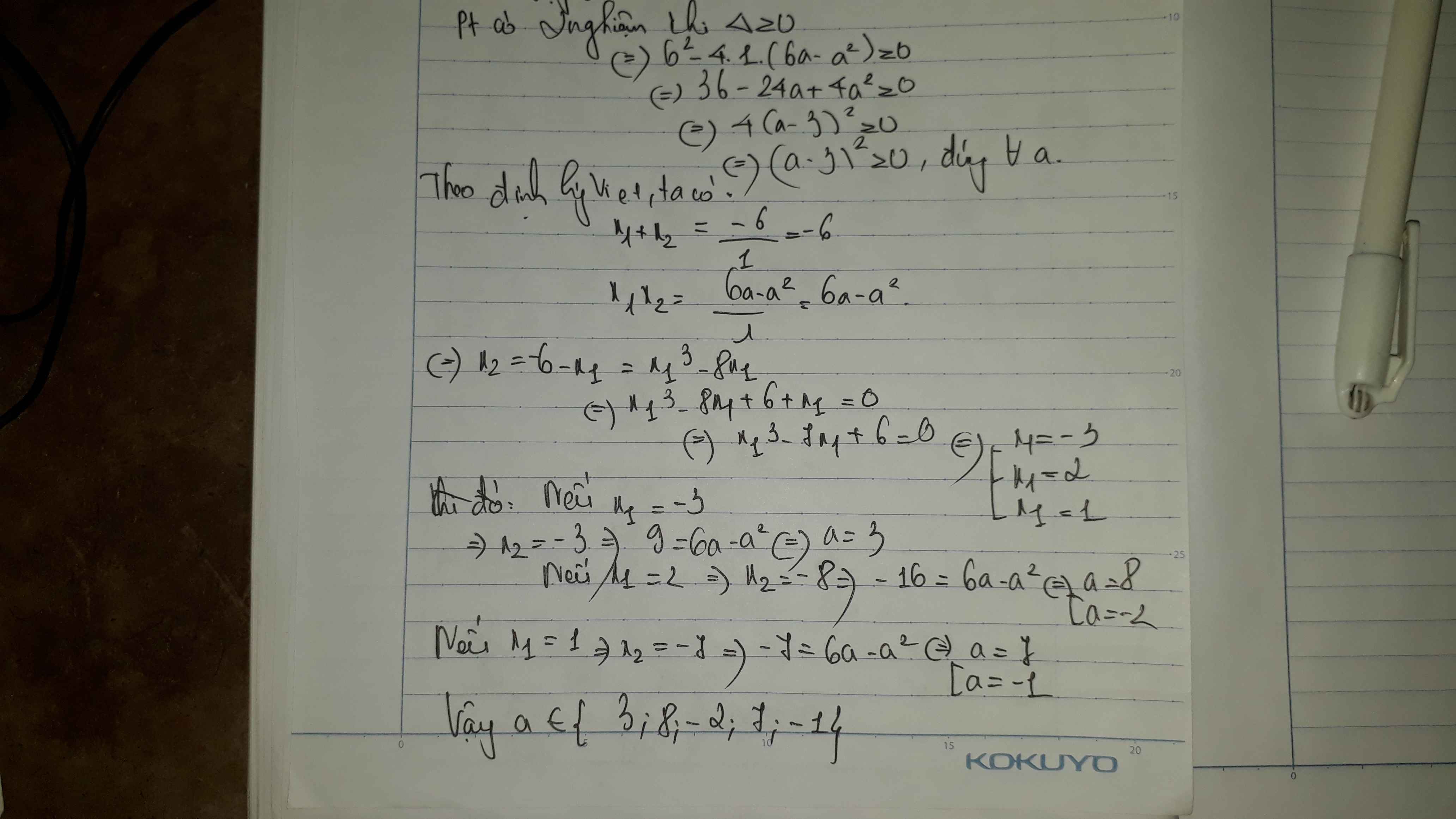Hãy nhập câu hỏi của bạn vào đây, nếu là tài khoản VIP, bạn sẽ được ưu tiên trả lời.

xét denta như bình thường r dùng viet =>x1+x2=5 rút x2 =5-x1 thay vào bt kia tìm x1 =>x2 rồi thay x1,x2 vào x1.x2=c/a tìm m

X2 -5X +m -3 =0 (#)
phtình (#) có 2 nghiệm phân biệt x1x2
denta >0
(-5)2 - 4 . 1 . (m-3) > 0
25 -4m + 12 > 0
37 -4m >0
m<37/4
với m< 37/4 áp dụng định lí vi ét ta có :
- x1 +x2 =5
- x1x2=m-3 => thay x1 + x2 vào (1)/ thay x1x2 vào (1)

b) phương trình có 2 nghiệm \(\Leftrightarrow\Delta'\ge0\)
\(\Leftrightarrow\left(m-1\right)^2-\left(m-1\right)\left(m+3\right)\ge0\)
\(\Leftrightarrow m^2-2m+1-m^2-3m+m+3\ge0\)
\(\Leftrightarrow-4m+4\ge0\)
\(\Leftrightarrow m\le1\)
Ta có: \(x_1^2+x_1x_2+x_2^2=1\)
\(\Leftrightarrow\left(x_1+x_2\right)^2-2x_1x_2=1\)
Theo viet: \(\left\{{}\begin{matrix}x_1+x_2=-\dfrac{b}{a}=2\left(m-1\right)\\x_1x_2=\dfrac{c}{a}=m+3\end{matrix}\right.\)
\(\Leftrightarrow\left[-2\left(m-1\right)^2\right]-2\left(m+3\right)=1\)
\(\Leftrightarrow4m^2-8m+4-2m-6-1=0\)
\(\Leftrightarrow4m^2-10m-3=0\)
\(\Leftrightarrow\left[{}\begin{matrix}m_1=\dfrac{5+\sqrt{37}}{4}\left(ktm\right)\\m_2=\dfrac{5-\sqrt{37}}{4}\left(tm\right)\end{matrix}\right.\Rightarrow m=\dfrac{5-\sqrt{37}}{4}\)

a, Thay \(m=-3\) vào \(\left(1\right)\)
\(x^2-2.\left(m-1\right)x-m-3=0\\ \Leftrightarrow x^2-2.\left(-3-1\right)x+3-3=0\\ \Leftrightarrow x^2+8x=0\\ \Leftrightarrow x\left(x+8\right)=0\\ \Leftrightarrow\left[{}\begin{matrix}x=0\\x=-8\end{matrix}\right.\)
Vậy với \(m=-3\) thì \(x=0;x=-8\)
b,
\(\Delta'=\left[-\left(m-1\right)\right]^2-1.\left(-m-3\right)\\ =m^2-2m+1+m+3\\ =m^2-m+4\)
phương trình có hai nghiệm phân biệt
\(\Delta'>0\\ m^2-m+4>0\\ \Rightarrow m^2-2.\dfrac{1}{2}m+\dfrac{1}{4}+\dfrac{7}{2}>0\\ \Leftrightarrow\left(m-\dfrac{1}{2}\right)^2+\dfrac{7}{2}>0\left(lđ\right)\)
\(\Rightarrow\forall m\)
Áp dụng hệ thức Vi ét :
\(\left\{{}\begin{matrix}x_1+x_2=2\left(m-1\right)\\x_1x_2=-m-3\end{matrix}\right.\)
\(\left(x_1-x_2\right)^2=4m^2-5\left(x_1+x_2\right)\\ \Leftrightarrow x_1^2+2x_1.x_2+x^2_2-4x_1x_2=4m^2-5\left(x_1+x_2\right)\\ \Leftrightarrow\left(x_1+x_2\right)^2-4x_1x_2=4m^2-5\left(x_1+x_2\right)\\ \Leftrightarrow\left(2.\left(m-1\right)\right)^2-4.\left(-m-3\right)=4m^2-5.\left(-m-3\right)\\ \Leftrightarrow4m^2-8m+4+4m+12-4m^2-5m-15=0\\ \Leftrightarrow-9m+1=0\\ \Leftrightarrow m=\dfrac{1}{9}\)
Vậy \(m=\dfrac{1}{9}\)
a.
Thế m = -3 vào phương trình (1) ta được:
\(x^2-2\left(-3-1\right)x-\left(-3\right)-3=0\)
\(\Leftrightarrow\) \(x^2+8x=0\)
\(\Leftrightarrow x\left(x+8\right)=0\\ \Rightarrow x_1=0,x_2=-8\)
b.
Để phương trình (1) có hai nghiệm phân biệt thì:
\(\Delta>0\\ \Leftrightarrow\left[-2\left(m-1\right)\right]^2-4.1.\left(-m-3\right)>0\)
\(\Leftrightarrow4.\left(m^2-2m+1\right)+4m+12>0\)
\(\Leftrightarrow4m^2-8m+4+4m+12>0\)
\(\Leftrightarrow4m^2-4m+16>0\)
\(\Leftrightarrow\left(2m\right)^2-4m+1+15>0\)
\(\Leftrightarrow\left(2m-1\right)^2+15>0\)
Vì \(\left(2m-1\right)^2\) luôn lớn hơn hoặc bằng 0 với mọi m nên phương trình (1) có nghiệm với mọi m.
Theo viét:
\(\left\{{}\begin{matrix}x_1+x_2=2m-2\\x_1x_2=-m-3\end{matrix}\right.\) (I)
có:
\(\left(x_1-x_2\right)^2=4m^2-5x_1+x_2\)
<=> \(x_1^2-2x_1x_2+x_2^2-4m^2+5x_1-x_2=0\)
<=> \(x_1^2-2x_1x_2+x_2^2+2x_1x_2-2x_1x_2-4m^2+5x_1-x_2=0\)
<=> \(\left(x_1+x_2\right)^2-4x_1x_2-4m^2+5x_1-x_2=0\)
<=> \(\left(2m-2\right)^2-4.\left(-m-3\right)-4m^2+5x_1-x_2=0\)
<=> \(4m^2-8m+4+4m+12-4m^2+5x_1-x_2=0\)
<=> \(-4m+16+5x_1-x_2=0\)
<=> \(5x_1-x_2=4m-16\) (II)
Từ (I) và (II) ta có:
\(\left\{{}\begin{matrix}5x_1-x_2=4m-16\left(2\right)\\x_1+x_2=2m-2\left(3\right)\\x_1x_2=-m-3\left(4\right)\end{matrix}\right.\)
Từ (2) ta có:
\(x_1=\dfrac{4m-16+x_2}{5}=\dfrac{4}{5}m-3,2+\dfrac{1}{5}x_2\) (x)
Thế (x) vào (3) được:
\(\dfrac{4}{5}m-3,2+\dfrac{1}{5}x_2+x_2=2m-2\)
<=> \(\dfrac{4}{5}m-3,2+\dfrac{1}{5}x_2+x_2-2m+2=0\)
<=> \(-1,2m-1,2+1,2x_2=0\)
<=> \(x_2=1,2m+1,2\) (xx)
Thế (xx) vào (3) được:
\(x_1+1,2m+1,2=2m-2\)
<=> \(x_1+1,2m+1,2-2m+2=0\)
<=> \(x_1-0,8m+3,2=0\)
<=> \(x_1=-3,2+0,8m\) (xxx)
Thế (xx) và (xxx) vào (4) được:
\(\left(-3,2+0,8m\right)\left(1,2m+1,2\right)=-m-3\)
<=> \(-3,84m-3,84+0,96m^2+0,96m+m+3=0\)
<=> \(0,96m^2-1,88m-0,84=0\)
\(\Delta=\left(-1,88\right)^2-4.0,96.\left(-0,84\right)=6,76\)
\(m_1=\dfrac{1,88+\sqrt{6,76}}{2.0,96}=\dfrac{7}{3}\left(nhận\right)\)
\(m_2=\dfrac{1,88-\sqrt{6,76}}{2.0,96}=-\dfrac{3}{8}\left(nhận\right)\)
T.Lam


\(\Delta=25-4\left(m-3\right)=37-4m\ge0\Rightarrow m\le\frac{37}{4}\)
Theo Viet ta có: \(\left\{{}\begin{matrix}x_1+x_2=5\\x_1x_2=m-3\end{matrix}\right.\)
Mặt khác do \(x_1\) là nghiệm nên:
\(x_1^2-5x_1+m-3=0\Leftrightarrow x_1^2=5x_1-m+3\)
Áp dụng:
\(x_1^2-2x_1x_2+3x_2=1\)
\(\Leftrightarrow5x_1-m+3-2\left(m-3\right)+3x_2=1\)
\(\Leftrightarrow5x_1+3x_2=3m-8\)
Kết hợp Viet ta có hệ: \(\left\{{}\begin{matrix}x_1+x_2=5\\5x_1+3x_2=3m-8\end{matrix}\right.\) \(\Rightarrow\left\{{}\begin{matrix}x_1=\frac{3m-23}{2}\\x_2=\frac{33-3m}{2}\end{matrix}\right.\)
Mà \(x_1x_2=m-3\Leftrightarrow\left(\frac{3m-23}{2}\right)\left(\frac{33-3m}{2}\right)=m-3\)
\(\Leftrightarrow9m^2-164m+747=0\Rightarrow\left[{}\begin{matrix}m=\frac{83}{9}\\m=9\end{matrix}\right.\) (đều thỏa mãn)